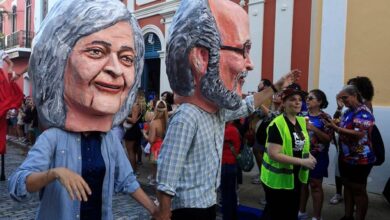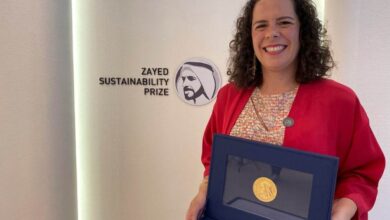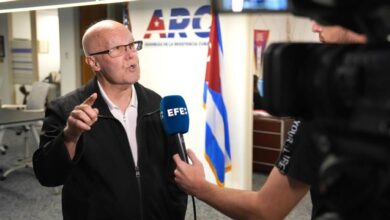Amnesty: a win for Colombia’s peace process?

Liliany Obiando is finally free – after nine years.
For almost a decade, Colombian sociologist, human rights worker and former political prisoner Liliany Obando has been engaged in a long and complex battle with the Colombian state and judicial system. She was charged with ‘rebellion’ in 2008, but this March the state officially granted her amnesty, in what she calls a ‘major achievement’.
The amnesty came as part of the peace process between the Colombian government and the FARC guerrillas (Revolutionary Armed Forces of Colombia), which was passed by congress in November. An amnesty law was agreed to pardon those accused of minor crimes in the war – both guerrillas and the military.
The law has also been extended to include human rights workers, union members, student activists and others who have been imprisoned for political crimes over the years. According to human rights organizations, thousands of political prisoners are now eligible for amnesty.
When Obando was arrested in 2008, she was a human rights director and fundraiser for FENSUAGRO, Colombia’s largest agriculture workers’ union.
She was initially accused of rebellion and aiding a terrorist organization after investigators supposedly found documents connected to her on the computer of Raul Reyes, a FARC leader who was killed by the Colombian military in Ecuador under Operation Fenix. The latter charge was eventually dropped after a judge ruled that evidence taken from this computer was illegal.
Obando was sentenced to 70 months in prison, fined $368,347, and banned from holding any public position until her sentence elapsed. She spent over three and half years in Buen Pastor prison in Bogotá. Like many other maximum security prisons in Colombia, it is known for its human rights abuses, particularly extreme overcrowding, poor hygienic conditions, and absence of medical care for prisoners, according to human rights organization a href=http://www.justiceforcolombia.org/news/article/1352/report-describes-appalling-conditions-in-bogotas-prisons >Justice for Colombia.
In 2012, Obando was granted provisional freedom after the state recognized that she was a sociologist, teacher and single mother – not an enemy of the state. She spent a year under house arrest in her small apartment in Bogotá that she shared with her mother and two children. The state also continued to pursue her. Once, officials brought her IGNORE INTO custody, where, unable to contact her lawyers, she was questioned and detained for 14 days by Colombia’s special intelligence service, DAS.
Thanks to the amnesty, she is less likely to be detained again. Her fine has been cancelled and she now has the possibility to obtain public employment. She explains what this amnesty law means for her and Colombia’s peace process.
It has been more than five years since you were released from jail. What does this amnesty mean for you now?
This process has been very complex and long. It started in 2008, and then in 2012 I was let out on provisional release, having been in prison for almost four years without being sentenced. So that was the first freedom, but the process continued its course of investigation.
Even though it was an unjust sentence… throughout the process, I went from confinement to confinement, three imprisonments. They accused me of appearing in Reyes’ computer [files], but when I was convicted they said they weren’t actually sentencing me for that [because the computer was obtained illegally]. So they attached other supposed crimes to me, which never appeared in the investigation. That’s to say, neither the lawyers nor we had a chance to debate it, and that’s a right that everyone has who is being investigated. I was sentenced illegally.
Until the amnesty law, I still had the burden of the fine to pay, even though my freedom was given in 2015. As well as being condemned illegally by the State, they ordered me to pay this fine to the victims’ unit, as if I had somehow caused a victim harm, which never happened. So I refused to pay. As a woman and a single mother, out of the workforce, I couldn’t pay. They didn’t let me return to my professional post. So what does a woman in these conditions do?
My lawyers requested an amnesty for this penalty, and to remove my inability to take public-sector jobs.
In December 2016, we applied for the amnesty, as a result of the Peace Talks between the FARC and the government.
So your amnesty has a link with the peace talks?
Yes, all the amnesties have a link with the peace agreement. In this agreement, the fifth point is the one about victims.
The FARC and the government agreed on and created a unique system in the world of justice: the Integral System of Truth, Justice, Reparation and Non-repetition. This new judicial system will judge all sides involved in the conflict, not only the FARC guerrillas but also the people, army, police, paramilitaries… Everyone who was involved in the armed conflict.
It is a special justice, because its purpose will not be to imprison, a system that already exists in Colombia, but a restorative justice. It changes the idea that prisons are the only form of punishment.
Within this special jurisdiction for peace, they mention a need to create a law of amnesty. No insurgent organization will sign a peace agreement without demanding the release of their members who are being held prisoner. The military and state prisoners being held by the FARC were released during other processes throughout the war, as a unilateral decision taken by the FARC. So, if the FARC wasn’t holding members of the state when the peace accords were signed, the only political prisoners were those in Colombian jails.
Not all the political prisoners were members of the FARC. There are members of the ELN [the National Liberation Army, Colombia’s second-largest guerrilla group] and other insurgency groups, but also a large number of political prisoners from social organizations: campesino groups, human rights workers, students, academics. The authorities began to flag any person for thinking distinctly or similarly to how the insurgency thought. They took us out of our spaces of struggle and militancy and put us in jail.
I was condemned for crimes of rebellion, a political crime, so I had the right to request amnesty.
Is it true that the government has blocked the amnesty law from being included in the constitution?
Well, it’s still under discussion, the creation of the special jurisdiction for peace. It’s at a stage called ‘conciliation’, but the court still has to review it. The special jurisdiction for peace cannot not be installed, but this government has already made changes that weren’t in the final agreement.
It is not yet known whether it will be in the constitution or not. But what is certain is that the government has to comply, as it has already been approved as law.
Following the work of certain congresspeople – including [former rightwing president] Alvaro Uribe’s Centro Democratico Party – there is a new need to regulate this law through a special decree, the decree 267 of January 2017, which places conditions on those who can apply for the law of amnesty.
This law grants amnesty to those people who, in the context of the armed conflict, were linked to the insurgency, investigated and sentenced. But they did not necessarily belong to the insurgency.
Are things actually changing for good in the country now? Do you have more faith in the peace process?
We always knew that implementing the peace process would be more difficult than the negotiation part. There are some in Colombian politics who are very reactionary and don’t accept what was agreed. They interfere not only through political means but through the continuance of the ‘Dirty War’ that we have lived so much of in this country: through assassinations and reviving paramilitary groups.
The government promised to disrupt those armed groups, but in reality they are not doing that at all, and [the paramilitary groups] are becoming stronger because the FARC has left the zones they once controlled. These groups took over these territories, and are sending a message rejecting the peace agreement. They are mainly sending this message to social movements by assassinating their leaders and pursuing people from union organizations, popular movements, peasants supporting the peace process. An incredible number of social-movement leaders have been assassinated since the signing of the peace accord.
So, the climate is really tense, but the amnesty law is also incredible.
But it was signed in December, and you can count on the fingers of one hand the number of prisoners [who have been released]. I was [lucky because I was] already out [of prison], which meant I could go and see my lawyers and get all the paperwork and formalities ready. But the people who are still in jail have had a number of problems pursuing the amnesty law. They are almost all still in prison. Lawyers are asking details that they say are necessary, but this has made the whole process more cumbersome. This process of who should be released, who should not, who complies, who does not… So with all these pretexts, they are leaving people in jail longer.
In January a decree was released to clear up these doubts, but now the judges responsible for processing the amnesty requests have called a strike. They belong to a union called Zona Judicial, and they say, ‘There are many amnesty cases and we don’t have sufficient personnel, plus the government owes us a lot of money, so we are not taking any more cases.’
You were accused of ‘rebellion’, but what does that mean exactly?
Well, for many of the people who fought for national liberation, rebellion was not a crime but a right. Even in the preamble to the UN Declaration of Human Rights of 1948 it says that every person that has been subjected to an oppressive regime or been oppressed has the right to rebel.
But in Colombian legislation, there is a long explanation of ‘rebel’ groups without arms, which is what rebellion means, and was assumed to be a crime in the Colombian penal code. So, rebelling against the Colombian state – even if it is an oppressive state – is a crime. But because it is a political crime, you can request an amnesty, which you cannot get for common crimes.
Judges and magistrates have amplified the law, depending on who is in government. It keeps getting modified. So, they say, ‘Now it’s not only an act of rebellion if you are armed, but also if you look for help, or look for financing, or anything for an organized group.’ This is why a lot of people end up in jail accused of rebellion.
You were in Bueno Pastor prison in Bogotá. What are the conditions inside Colombian prisons like for women?
There is no differential treatment in the justice system between men and women’s prisons. But 9 out of 10 women in prison are mothers, and that puts women in a particular place of vulnerability, not only for them, but for their families.
The majority of those mothers are also the head of the household, because the fathers are absent. So where are these kids? When you take away their mother, who cares for them, feeds them, protects them? There are no re-socialization [programmes for the female prisoners], no opportunities to study and no compensated work. The most affected by this are the minors, the sons and daughters of the mothers in prison.
The prison population is 120,000, but women only represent some 6 or 7,000 of them. This could be seen as positive, that [lots of] women aren’t going to prison. But, it’s also negative, because it means that these women are completely invisible inside the prison [system], because the system thinks all the time in terms of the masculine. But women and men have very different needs, different bodies.
This affected you too, didn’t it?
Yes, but because of the age of my kids, they were never in prison with me. Children can only be with their mothers [in prison] from 0 to 3 years old, then they take them away. You have to give them up, whether or not you have family on the outside to help you. If you don’t, you have to give them to the Family Welfare institute.
What do you want to see happen with the amnesty law?
What we need first is to get the prisoners their freedom. Part of our activist work with the political prisoners has been solidarity, judicial campaigning and training, trying to get them involved in courses. The aparatus that controls the prisons, the National Penitentiary and Prisons Institute, puts a lot of obstacles in the way for us as human rights workers. But there are sometimes also difficulties between those doing the solidarity work.
We are also presenting a complaint asking why people have not yet been released. Also, the few who have been let go face very difficult conditions: people get sick, people leave [prison] without clothes, they don’t have anywhere to go. So, what we also do is try to provide for their exit, give them a safe departure.
New Internationalist |





